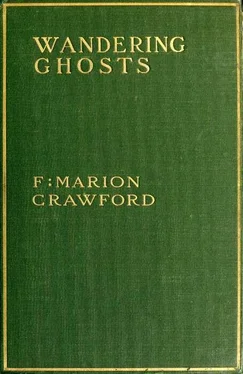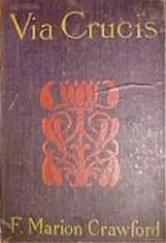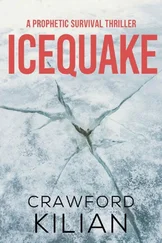F. Crawford - Wandering Ghosts
Здесь есть возможность читать онлайн «F. Crawford - Wandering Ghosts» весь текст электронной книги совершенно бесплатно (целиком полную версию без сокращений). В некоторых случаях можно слушать аудио, скачать через торрент в формате fb2 и присутствует краткое содержание. Год выпуска: 2012, Жанр: Ужасы и Мистика, на английском языке. Описание произведения, (предисловие) а так же отзывы посетителей доступны на портале библиотеки ЛибКат.
- Название:Wandering Ghosts
- Автор:
- Жанр:
- Год:2012
- ISBN:нет данных
- Рейтинг книги:3 / 5. Голосов: 1
-
Избранное:Добавить в избранное
- Отзывы:
-
Ваша оценка:
- 60
- 1
- 2
- 3
- 4
- 5
Wandering Ghosts: краткое содержание, описание и аннотация
Предлагаем к чтению аннотацию, описание, краткое содержание или предисловие (зависит от того, что написал сам автор книги «Wandering Ghosts»). Если вы не нашли необходимую информацию о книге — напишите в комментариях, мы постараемся отыскать её.
Wandering Ghosts — читать онлайн бесплатно полную книгу (весь текст) целиком
Ниже представлен текст книги, разбитый по страницам. Система сохранения места последней прочитанной страницы, позволяет с удобством читать онлайн бесплатно книгу «Wandering Ghosts», без необходимости каждый раз заново искать на чём Вы остановились. Поставьте закладку, и сможете в любой момент перейти на страницу, на которой закончили чтение.
Интервал:
Закладка:
It got worse after that, and the men watched the cook, and the cook watched the men, as if they were trying to catch each other; but I think everybody felt that there was something else. One evening, at supper-time, I was on deck, and Jack came aft to relieve the wheel while the man who was steering got his supper. He hadn't got past the main-hatch on the lee side, when I heard a man running in slippers that slapped on the deck, and there was a sort of a yell and I saw the coloured cook going for Jack, with a carving knife in his hand. I jumped to get between them, and Jack turned round short, and put out his hand. I was too far to reach them, and the cook jabbed out with his knife. But the blade didn't get anywhere near Benton. The cook seemed to be jabbing it into the air again and again, at least four feet short of the mark. Then he dropped his right hand, and I saw the whites of his eyes in the dusk, and he reeled up against the pin-rail, and caught hold of a belaying-pin with his left. I had reached him by that time, and grabbed hold of his knife-hand, and the other, too, for I thought he was going to use the pin; but Jack Benton was standing staring stupidly at him, as if he didn't understand. But instead, the cook was holding on because he couldn't stand, and his teeth were chattering, and he let go of the knife, and the point stuck into the deck.
"He's crazy!" said Jack Benton, and that was all he said; and he went aft.
When he was gone, the cook began to come to, and he spoke quite low, near my ear.
"There were two of them! So help me God, there were two of them!"
I don't know why I didn't take him by the collar, and give him a good shaking; but I didn't. I just picked up the knife and gave it to him, and told him to go back to his galley, and not to make a fool of himself. You see, he hadn't struck at Jack, but at something he thought he saw, and I knew what it was, and I felt that same thing, like a lump of ice sliding down my back, that I felt that night when we were bending the trysail.
When the men had seen him running aft, they jumped up after him, but they held off when they saw that I had caught him. By and by, the man who had spoken to me before told me what had happened. He was a stocky little chap, with a red head.
"Well," he said, "there isn't much to tell. Jack Benton had been eating his supper with the rest of us. He always sits at the after corner of the table, on the port side. His brother used to sit at the end, next him. The doctor gave him a thundering big piece of pie to finish up with, and when he had finished he didn't stop for a smoke, but went off quick to relieve the wheel. Just as he had gone, the doctor came in from the galley, and when he saw Jack's empty plate he stood stock still staring at it; and we all wondered what was the matter, till we looked at the plate. There were two forks in it, sir, lying side by side. Then the doctor grabbed his knife, and flew up through the hatch like a rocket. The other fork was there all right, Mr. Torkeldsen, for we all saw it and handled it; and we all had our own. That's all I know."
I didn't feel that I wanted to laugh when he told me that story; but I hoped the Old Man wouldn't hear it, for I knew he wouldn't believe it, and no captain that ever sailed likes to have stories like that going round about his ship. It gives her a bad name. But that was all anybody ever saw except the cook, and he isn't the first man who has thought he saw things without having any drink in him. I think, if the doctor had been weak in the head, as he was afterwards, he might have done something foolish again, and there might have been serious trouble. But he didn't. Only, two or three times, I saw him looking at Jack Benton in a queer, scared way, and once I heard him talking to himself.
"There's two of them! So help me God, there's two of them!"
He didn't say anything more about asking for his discharge, but I knew well enough that if he got ashore at the next port we should never see him again, if he had to leave his kit behind him, and his money, too. He was scared all through, for good and all; and he wouldn't be right again till he got another ship. It's no use to talk to a man when he gets like that, any more than it is to send a boy to the main truck when he has lost his nerve.
Jack Benton never spoke of what happened that evening. I don't know whether he knew about the two forks, or not; or whether he understood what the trouble was. Whatever he knew from the other men, he was evidently living under a hard strain. He was quiet enough, and too quiet; but his face was set, and sometimes it twitched oddly when he was at the wheel, and he would turn his head round sharp to look behind him. A man doesn't do that naturally, unless there's a vessel that he thinks is creeping up on the quarter. When that happens, if the man at the wheel takes a pride in his ship, he will almost always keep glancing over his shoulder to see whether the other fellow is gaining. But Jack Benton used to look round when there was nothing there; and what is curious, the other men seemed to catch the trick when they were steering. One day the Old Man turned out just as the man at the wheel looked behind him.
"What are you looking at?" asked the captain.
"Nothing, sir," answered the man.
"Then keep your eye on the mizzen-royal," said the Old Man, as if he were forgetting that we weren't a square-rigger.
"Ay, ay, sir," said the man.
The captain told me to go below and work up the latitude from the dead-reckoning, and he went forward of the deck-house and sat down to read, as he often did. When I came up, the man at the wheel was looking round again, and I stood beside him and just asked him quietly what everybody was looking at, for it was getting to be a general habit. He wouldn't say anything at first, but just answered that it was nothing. But when he saw that I didn't seem to care, and just stood there as if there were nothing more to be said, he naturally began to talk.
He said that it wasn't that he saw anything, because there wasn't anything to see except the spanker sheet just straining a little, and working in the sheaves of the blocks as the schooner rose to the short seas. There wasn't anything to be seen, but it seemed to him that the sheet made a queer noise in the blocks. It was a new manilla sheet; and in dry weather it did make a little noise, something between a creak and a wheeze. I looked at it and looked at the man, and said nothing; and presently he went on. He asked me if I didn't notice anything peculiar about the noise. I listened awhile, and said I didn't notice anything.
Then he looked rather sheepish, but said he didn't think it could be his own ears, because every man who steered his trick heard the same thing now and then,—sometimes once in a day, sometimes once in a night, sometimes it would go on a whole hour.
"It sounds like sawing wood," I said, just like that.
"To us it sounds a good deal more like a man whistling 'Nancy Lee.'" He started nervously as he spoke the last words. "There, sir, don't you hear it?" he asked suddenly.
I heard nothing but the creaking of the manilla sheet. It was getting near noon, and fine, clear weather in southern waters,—just the sort of day and the time when you would least expect to feel creepy. But I remembered how I had heard that same tune overhead at night in a gale of wind a fortnight earlier, and I am not ashamed to say that the same sensation came over me now, and I wished myself well out of the Helen B. , and aboard of any old cargo-dragger, with a windmill on deck, and an eighty-nine-forty-eighter for captain, and a fresh leak whenever it breezed up.
Little by little during the next few days life on board that vessel came to be about as unbearable as you can imagine. It wasn't that there was much talk, for I think the men were shy even of speaking to each other freely about what they thought. The whole ship's company grew silent, until one hardly ever heard a voice, except giving an order and the answer. The men didn't sit over their meals when their watch was below, but either turned in at once or sat about on the forecastle, smoking their pipes without saying a word. We were all thinking of the same thing. We all felt as if there were a hand on board, sometimes below, sometimes about decks, sometimes aloft, sometimes on the boom end; taking his full share of what the others got, but doing no work for it. We didn't only feel it, we knew it. He took up no room, he cast no shadow, and we never heard his footfall on deck; but he took his whack with the rest as regular as the bells, and—he whistled "Nancy Lee." It was like the worst sort of dream you can imagine; and I daresay a good many of us tried to believe it was nothing else sometimes, when we stood looking over the weather rail in fine weather with the breeze in our faces; but if we happened to turn round and look into each other's eyes, we knew it was something worse than any dream could be; and we would turn away from each other with a queer, sick feeling, wishing that we could just for once see somebody who didn't know what we knew.
Читать дальшеИнтервал:
Закладка:
Похожие книги на «Wandering Ghosts»
Представляем Вашему вниманию похожие книги на «Wandering Ghosts» списком для выбора. Мы отобрали схожую по названию и смыслу литературу в надежде предоставить читателям больше вариантов отыскать новые, интересные, ещё непрочитанные произведения.
Обсуждение, отзывы о книге «Wandering Ghosts» и просто собственные мнения читателей. Оставьте ваши комментарии, напишите, что Вы думаете о произведении, его смысле или главных героях. Укажите что конкретно понравилось, а что нет, и почему Вы так считаете.












